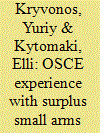| Srl | Item |
| 1 |
ID:
181662


|
|
|
|
|
| Summary/Abstract |
Despite the Lisbon Treaty's modifications in the foreign and security policy domain, the EU has frequently relied on third parties to address external conflicts and crises. Using the Ukrainian conflict as a case study, this article adopts the orchestration model to explain why and how the EU enlists intermediary actors over which it has no formal control to pursue its objectives. It finds that in this conflict the EU outsourced part of its crisis management activities to the Organization for Security and Co-operation in Europe because it lacked the civilian and military capabilities, as well as the regulatory competence and reputation to challenge Russia. Indeed, the Ukrainian case shows that orchestration has emerged as a crucial governance arrangement for the functioning of EU crisis management, raising serious questions about the EU overall capacity to act as a security provider in an international system marred by contestation and hard security concerns.
|
|
|
|
|
|
|
|
|
|
|
|
|
|
|
|
| 2 |
ID:
083383


|
|
|
|
|
| Publication |
2008.
|
| Summary/Abstract |
The experience acquired by the Organization for Security and Co-operation in Europe (OSCE) in implementing the UN Programme of Action on Small Arms has demonstrated how complex the problems related to surplus small arms, light weapons (SALW) and conventional ammunition (CA) are. Today, many OSCE states face challenges with large reserves of surplus weapons. Limited national capacities and lack of financial resources have made cooperation and assistance in the OSCE of crucial importance, and made the Organization a significant actor in this area. This essay presents the OSCE assistance mechanism and focuses on two case studies - Belarus and Tajikistan - where major SALW and CA projects have been recently concluded.
The essay finds that destruction is the most desirable method to dispose of surplus small arms and conventional ammunition. It should be advocated to avoid leakages of weapons from legal market to 'grey' and illegal spheres. Because of the risks of diversion and the threats that surplus stocks may pose to human and environmental security, the essay argues that surplus stocks should be given priority attention in national policy-making.
Stronger international norms and standards should be agreed upon to address the problem properly, based on the already existing provisions set out in agreements adopted inter alia by the OSCE. Providing assistance to states in solving the problems related to SALW and conventional ammunition is also seen of crucial importance. These assistance projects should be carefully planned and effectively implemented, and the essay presents a series of factors that could be considered in this regard.
|
|
|
|
|
|
|
|
|
|
|
|
|
|
|
|